THOUGHTS ON MINIMALISM FOR REAL LIFE
Minimalism sometimes feels unattainable or unrealistic but I don’t think it has to be this way. Take a warm-hearted, gentle approach to living an intentional life, full of purpose and less full of stuff. Here are some personal thoughts on minimalism for real life.
WHAT IS MINIMALISM?
I’ve been thinking a lot recently about minimalism and how it works in real life. We hear about getting rid of stuff, breaking the constant cycle of clutter, making intentional decisions about what we keep in and let go of in life and building a meaningful life with less stuff.
Minimalism is about all of these things but minimalism for real life has a few other things to consider too.
Real life is up and down and how we respond to these challenges and opportunities shapes our direction in life. We also have a variety of tools and resources at our disposal and some of us have more than others.
In my own life I’ve used minimalism to guide my choices. Decluttering is the tool that helped me clear space and minimalism is the lifestyle that helps me stay clutter-free, in my home, schedule, heart and mind.
For an introduction to the minimalist lifestyle, you might enjoy these articles:
- What is minimalism (and a few things it’s not)
- How to get started with minimalism – 7 easy ways to begin
There’s no textbook to follow that would help me weave minimalism into my own life so I found my own way, but that’s not to say it was straightforward!
In this article, I’m sharing a few thoughts on minimalism for real life. So, if you’re currently exploring, curious to begin exploring or have got a little stuck with minimalism for yourself, it may be helpful to read on.
I hope we can all be encouraged to find a gentle, non-judgemental way of living a minimalist life too.
MYTHS OF MINIMALISM
I think it’s also worth pointing out that minimalism often gets a raw deal. It’s often mistaken for a cold, dull and empty life. For me, what’s worse still, is that we’re led to believe minimalism is only for a certain type of person and not realistic for others. If I’m being honest, I’d be a much more ‘minimalist’ type of minimalist if I didn’t have a hoarder husband and messy kids, but I do and I still find a way to weave minimalism into my home and life.
If you’re interested, you might like to read more about some of the myths about minimalism and why I think they’re a little misleading.
FINDING YOUR OWN VERSION OF MINIMALISM
Minimalism for real life is all about approaching it in your own unique way. I don’t want to get rid of my hoarder husband and messy kids but I do want to get rid of the clutter that resides in my home and life. I want time, space and freedom too.
So, through trial and error, I’ve learnt how important it is to find your own version of minimalism. A version that’s realistic for your season of life and who and what is sharing it with you!
You might enjoy this article on how to find your own version of minimalism for some ideas for your own life.
“Minimalism looks different for everyone because it’s about finding what is essential to you.”
(The Minimalists)
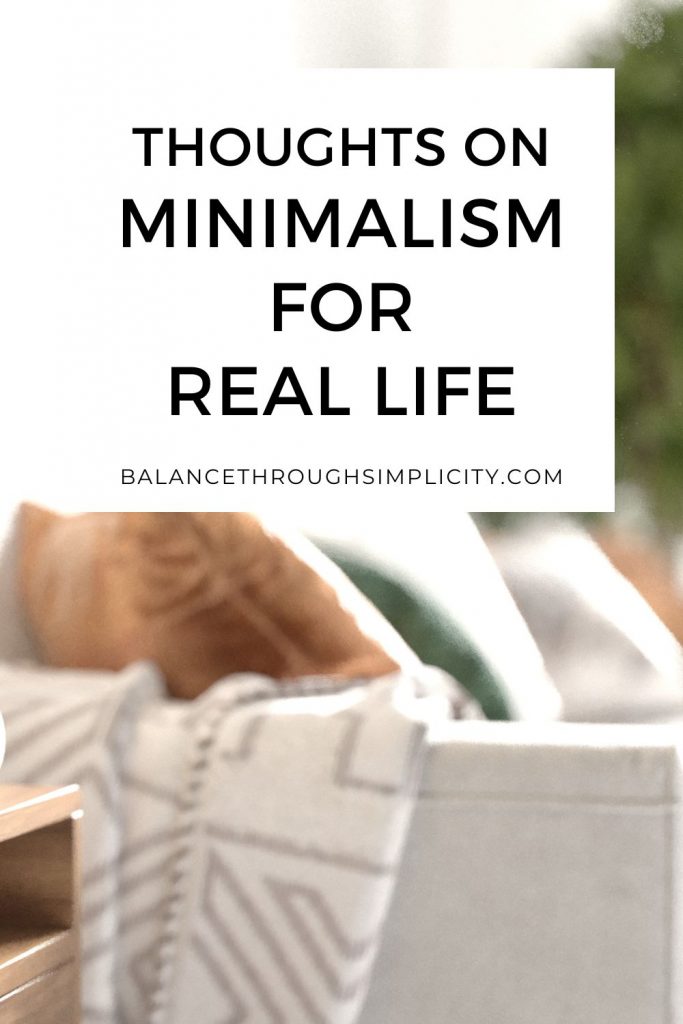
MINIMALISM FOR REAL LIFE
In this article I wanted to share some thoughts on minimalism for real life. It’s not meant to put you off but just to offer an honest and personal perspective on how I’ve incorporated minimalism into my life over the years and what I’ve discovered along the way.
1. Minimalism does not make life easy
If you’re looking for a way to make life easier, minimalism is not a magical wand. Life can provide many challenges and in my own life, these challenges haven’t stopped just because I adopted a minimalist life.
Over the years, I’ve had personal and family experience of physical health problems, loss of both parents, grief at the death of my first born and debilitating anxiety and depression. I mention these in passing, but their reference skates just the surface. In actual fact, they’ve shaped my path in life and have made me do some tough inner work just to come out the other side, let alone find peace and joy.
We all have our own unique set of challenges and demons to conquer and although this isn’t the time or space to share all of my story, I did want to be realistic and honest and say that minimalism does not make life easy. Life happens and **** still hits the fan.
If minimalists come across as though life is as perfectly precise as their homes would suggest, then there’s probably more to their life that you won’t be seeing, sometimes by choice and sometimes by design. Every human who’s lived a little knows that life isn’t perfect.
But, and it’s a big but, minimalism does make life easier.
I find the challenges are easier to navigate and overcome because I have more space, flexibility and bandwidth to ride the storms and do what I need to do to get through them.
I can focus more on what’s important when I’m not having to also focus on the unimportant.
2. Minimalism isn’t always easy in itself
Minimalism isn’t easy.
Sometimes you have to explain your life choices to others who haven’t yet found their way to a ‘less is more’ mindset. It’s countercultural to intentionally choose less when most of the time we’re encouraged to have, be and do more. It takes courage, self-reflection and motivation to explore a more minimalist approach. It’s tough when we care what others think, lack support or just don’t have time or energy to put our current life on hold whilst we explore an alternative path.
Another way that minimalism isn’t easy is that it requires you to be mindful and aware of what you let into your life and what you keep out. Being such an intentional guardian of your home, schedule, heart and mind can feel hard work when you’re just starting out! It’s probably so much easier to let the clutter pile up, say yes to things so you don’t get FOMO (Fear Of Missing Out), worry about letting people down or how you’re going to even find the courage to say no in the first place. It’s definitely easier to give into temptation and snap up those sale bargains that catch your eye rather than being disciplined enough to look the other way.
What I’ve mentioned may be easier, but really they’re only easier for the short term. Over the long term, ignoring your clutter through clutter blindess means your home will become full of stuff, saying yes to everything could lead to resentment and burnout and unhealthy shopping habits can lead to debt and stress.
Minimalism requires effort, perseverance and motivation to constantly curate your life. Over time, it becomes second nature and something we do without really thinking about it. Starting off is difficult but there are some wonderful benefits to minimalism that, although not easy, make it very much worth it.
Journal prompts: Do you feel a minimalist life is easy or difficult? If difficult, why? Is it because of external circumstances or is it because of your own expectations? What are the barriers getting in your way of living more minimally? How can you overcome them?
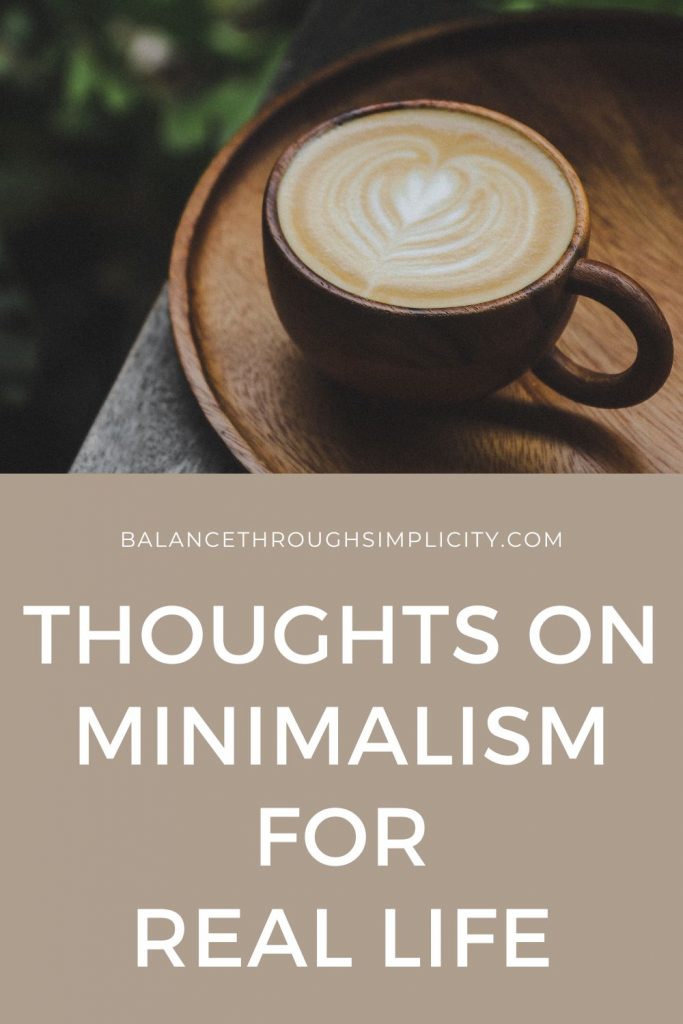
3. Minimalism is about what your life feels like (not what it looks like)
Finding your own version of minimalism is important because a minimalist lifestyle works best when incorporated into your existing life rather than trying to replace or reinvent it.
It’s no good trying to live with just 100 items if you have a busy family and home. Minimalism expressed like that would probably be highly unrealistic and downright hard!
I don’t really like to advise on how many items of things to own. I talk about getting rid of duplicates but I don’t think I’ve ever mentioned how many tops or bottoms or pots and pans you should own. Instead, I like to think about minimalism in terms of what your home and life FEELS like, not what it looks like.
Look around you now. Does your home make you feel calm and content or cluttered and chaotic?
I think finding your version of minimalism, the sweet spot of minimalism, is when your home and life feels like you want them to feel like. Declutter too much and that’s likely to stress you because you focus too much on clutter. Declutter not enough and your stuff will still stress you out.
I think it’s better to strike a happy balance between the two extremes so that you feel good about your home and life. Only you will know where that happy balance lies and it may be trial and error until you find it!
One little tip I’ve found helpful in decluttering my own home, is not about keeping set numbers of things. It’s more about allocating a certain space or place to an item and using that natural boundary to limit how much of that item I keep. For example, I have a small amount of hanging space in my closet and three drawers for my clothes. When I have too many clothes to fit comfortably in that space, I know it’s time to declutter. Or my two bookshelves. When they get filled, it’s time to choose some books to let go of. Their storage space defines how much of the item I want to keep.
Journal prompt: What does your home feel like now? Would you like it to feel differently? What about your life? Are you happy with how your life feels generally? Is your body calm and content or does it feel anxious, unsettled or stressed? What would make it feel better?
4. Minimalism won’t fit life into neat boxes (but you will need fewer boxes!)
Life is complex, full of twists and turns and often doesn’t turn out how you expected. This is why it’s incredibly difficult to plan for every eventuality. We can define our priorities, set goals, build healthy habits but at the end of the day, life will forge its own path which we do our best to navigate!
Fitting the challenges and opportunities of a chaotic, messy but beautiful life into neat little boxes is virtually impossible. As soon as you try to declutter, sort and organise your metaphorical little box in one area of your life, another box seems to be running empty, feeling overstuffed or just full of things that you don’t need but keep anyway.
The clutter in your storage systems at home is much like the storage systems for your life. Too much stuff and it’s difficult to get the most value out of what you have.
To continue with the analogy, a minimalist life means you have less stuff for your boxes so you can see what’s in them, draw on their contents as and when you need and you have more capacity to fill them up with stuff that you really want, will use, love and that will give you joy, ease and happiness. This applies to the boxes in your home and the boxes you use to organise your life.
5. Minimalism is not linear
I received an email recently from someone who said that they’re a minimalist at heart but, because of life circumstances, they were struggling with clutter and life just feels overwhelming. This resonated with me because I sometimes feel the same.
I’m by no means a perfect minimalist (if indeed this person exists!) because sometimes I let my pursuit of minimalism slide. It may not be for a long time and sometimes I don’t sway very far from my minimalist goals, but I’m not always on top of the clutter in my life.
- Writing this at my laptop, I can see a pile of paperwork on my desk that I haven’t yet had time to sort and action.
- I sometimes trip up and say yes when I wanted to say no.
- I do get tempted with a shopping trip just because it sounds fun.
- I have too many pretty mugs to drink my tea from (even though I decluttered them not long ago!).
This doesn’t mean that I don’t love minimalism or the values it encourages me to use to guide my way through life. What it does mean is that sometimes minimalism is two steps forward and one step back. I don’t think minimalism is about making wise decisions all the time or managing our homes and lives to the teeniest tiniest degree.
Minimalism is the paradigm for how you live your life, a mindset and guiding light to help you find your purposeful and intentional way in a world that consciously or unconsiously tries to pull off course.
If you struggle sometimes with too much stuff because you’re feeling low on energy, physical strength, positivity, courage or you’re just in a funk, it’s ok. We might all feel like that from time to time. Reconnect with yourself.
Journal prompt: What do you expect progress and development to look like in terms of your minimalist lifestyle? Life is about learning and exploration, the journey not the destination. What does your minimalist journey look like? What have you learnt along the way? Is there anything that you would do differently? Could you do things differently now? What would you need to make a start?
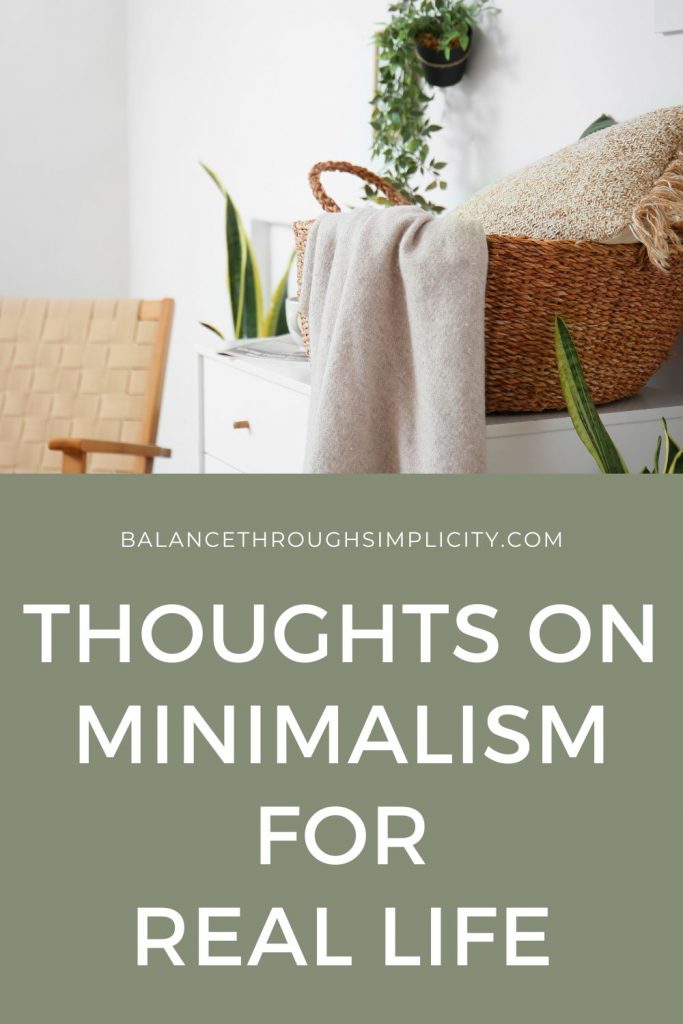
6. Minimalism may change over time
There’s another point about minimalism not always following a linear pattern that I think is really important and I’m using myself as an example here.
Regular readers might know that my mum passed away recently. My dad died some 15 years ago and I only have a very, very few family members remaining aside from my husband and kids. The last few months have been difficult and I’ve been going through the stages of grief whilst simultaneously going through my mum’s stuff.
I’ve never really been one to keep hold of things for sentimental reasons apart from photos maybe. But, recently I’ve been struggling. I haven’t been ready or willing to part with things that ‘minimalist me’ feels I should. And, even though I’m a minimalist, I’m ok with keeping these things that remind me of my mum, family and childhood.
Young, 20-something-me would have been far more ruthless but as I get a little older, I get a bit more sentimental. So, for now, if it’s a question of using space to define what I’m keeping and what I’m not (like I mentioned above). I’d rather keep one extra memory of my mum sitting on my shelf than one extra book that I could borrow from the library or buy again if I really wanted to.
I guess what I’m trying to say is the way you approach minimalism and the decisions you make about what’s important and what’s not may change as you change and life changes around you. This shape-shifting minimalism isn’t wrong, it just means your lifestyle and choices are reflecting your current needs and wants. This is just how it should be and far from the rigid, emotionless and stark minimalism that unfortunately so often gets perceived.
7. Minimalism is about trade-offs
I mentioned about the limits of my shelf and that wanting to keep one extra memory of my mum means getting rid of one of my books. This is a small example of how minimalism is about trade-offs.
We can’t have our cake and eat it and minimalism is no different. Whatever you decide to do, to keep, to let go of, to reclaim, to throw out, has a trade-off. And, I can’t honestly say that trade-offs are always easy to handle. Some decisions are easier than others, but sometimes we need to wrestle with our thoughts, our logical ‘head’ decisions vs our emotional ‘heart’ decisions.
- A trade-off could be not going shopping so you can save money but this would mean you can’t buy that new dress you had your eye on. Money vs buying something fancy and feeling good in it?
- Another trade-off could be saying no to an evening out with friends because your body needs rest but this would mean you might be missing out on all the fun. The human body’s need to rest and recharge vs feeling left out and not part of the action?
Every decision comes with a consequence and it’s important to recognise that minimalism often requires this OR that, not this AND that.
If we don’t get comfortable with the notion that we’re making choices for a better life and sometimes that means saying no (to clutter, to invitations, to too much social media scrolling, too much burning the midnight oil, too much in general) then it’s easier to make peace with our decisions and get on with living them, instead of resenting or giving up on them.
You may also find that, over time, your priorities change. To use the two examples above, you might find another way of feeling good than needing a dress to do that for you, or finding a sustainable balance between excitement and rest.
“Focus on having the life you want, not wanting the life you had.”
(Marissa Zen)
In a nutshell, choose wisely, decide with purpose, take action and commit to following it through. Minimalism is about a life of intention and you decide what direction that takes…
Action point: Try this free intentional living challenge to help you decide which direction you want to head in and how to make a start!
8. Minimalism is a guiding paradigm not a set of rules
Last but not least, let minimalism guide your life but not rule it. Minimalism is empowering and freeing. It’s not about your stuff but instead about how you THINK about your stuff.
Do some research, get comfortable with the idea of letting go of clutter in your home, schedule, heart and mind and make decisions about your life and how you want to live it every day based on what you want your home and life to feel like.
A set of rules about what you should and shouldn’t do as a minimalist isn’t always a helpful approach because minimalism is far more free, compassionate and inclusive than that. Whether you’re young, old, single, raising a large family, juggling busy life or having trouble just juggling yourself (!), minimalism has something to offer.
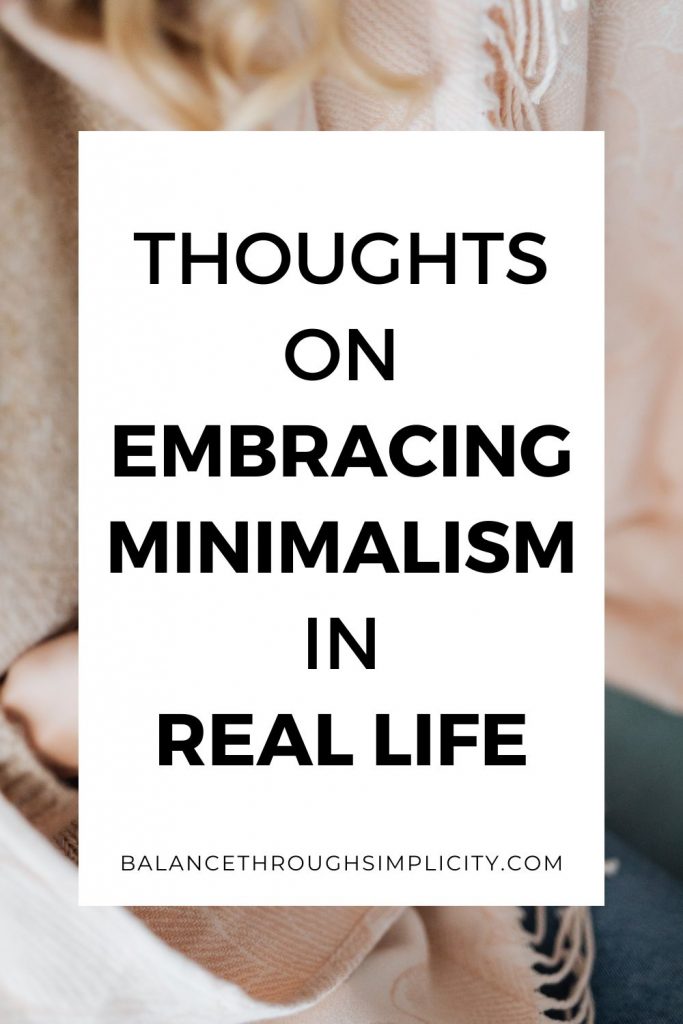
9. Learning as we go
Life is a lesson in learning. Nobody has all the answers but we gather wisdom and experience as we get older and try things out, by necessity and/or choice.
I’ve definitely learnt more about minimalism and my relationship with the different types of clutter in my life as I’ve grown older. Clutter isn’t just the stuff in your home. It’s limiting beliefs, unhealthy habits and relationships, debt, too much to do and too much on your mind causing stress in your body, plus a whole lot more…
When I was in my 20s I had less responsibilities than I do now. I’ve also lost more loved ones now and have more worries but I also have more financial stability. Life is swings and roundabouts.
You can think of the unwanted stuff in our lives a little bit like clutter and the clutter in my life now is different to the clutter I had 20 or so years ago so I’m having to learn all the time how to deal with it. Maybe you are too? Minimalism is about learning as we go and not being afraid to take action and make change.
Journal prompt: What clutters your life right now? Is it different to what’s cluttered your life in the past? How will you approach your current clutter? Can you use your past experience to guide you and give you confidence now?
IN SUMMARY
If you’ve been curious about minimalism, love it or a little guarded or unsure, thank you for reading. Minimalism isn’t for everyone because we all need different things at different times and it may just not be a priority for you right now. I get it. Sometimes it’s just enough struggle to get through the day.
I also understand that many people are uncertain how to engage with minimalism in their own lives when life keeps on coming at us. So, I think it’s important to be upfront and honest about what minimalism can do for us, and what it can’t. We live in the real world with ups, downs, raw bits and wobbles along the way, so we need realistic, approachable and warm-hearted minimalism.
These were just a few thoughts on minimalism for real life that I wanted to share with you today. I’d love to hear your thoughts too. Please leave a comment below!
RESOURCES ON MINIMALISM
To read more about how minimalism can help in other areas of your life, here are a few articles you might find helpful:
- Minimalist Morning Routine Tips to Start the Day Well
- Minimalism and Time Management: How The Minimalist Lifestyle Can Improve Your Productivity
- Minimalism and Social Media: How to Use Social Media Mindfully
- Minimalism and Money: How Minimalism Can Help You Save Money
- Minimalism and Shopping: How to Shop with Intention
- Does Minimalism Make You Happier? Simplicity and Happiness
- How to Spend Less Time Cleaning: Minimalist Cleaning Routines
DON’T MISS OUT!
I’m Antonia and on this blog I share practical inspiration to simplify your home, time and life. Follow me on Instagram, Facebook and Pinterest! You can also subscribe to Balance Through Simplicity and receive regular simplicity tips straight to your inbox for free. Make sure you never miss an article plus you’ll get a copy of my free Declutter Starter Kit as a welcome gift!

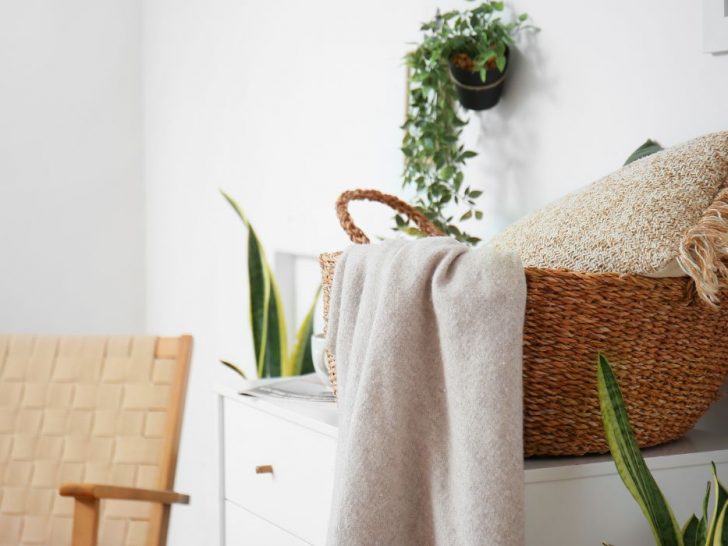
Barefoot Mike
Monday 27th of March 2023
Perhaps you could practice some minimalism on this site. Ironically, the advertising occupies more space than the actual content. Makes it very difficult to read, especially on a phone, when there's literally an ad between every paragraph.
Balance Through Simplicity
Monday 27th of March 2023
Hi, thank you for your feedback. Unfortunately, running a blog costs money. Although I have tried to stay ad-free for as long as possible, I'm not in a position to continue covering the costs personally so I had to make a decision to include ads or close the blog. It was a very difficult decision for me but I would rather run the site with ads in the hope that it helps some people, than close it and help no one. I do appreciate your feedback and will try to minimise the use of ads going forward.
Laura
Sunday 26th of March 2023
Hi, Antonia - first of all, let me say that I'm sorry for your loss.
Next, I'd really like to thank you for this glimpse into your personal life and some of the challenges you've encountered along the way. I struggle to relate to the minimalists in beautiful photo books that seem to have a perfectly curated life, with things like distressed end tables with three stacked books and a vase of tulips set against a snowy white clapboard wall - you know the thing. Hearing that you too have gone through struggles in your life is vastly encouraging.
Besides - the point of minimalism is to make our lives easier, right? Less stress, less "stuff" to maintain when we need to deal with more important matters, like the loss of a loved one. The last thing any of us needs is to use minimalism as another stick to beat our backs. So again - thank you. I appreciate your kindness and compassion, and your willingness to share your own struggle.
In my experience, grief doesn't declutter well. It just hangs about for far too long, taking up valuable inner space that we'd really rather use for something else. I hope your grief eases over time and that one day you'll be left with nothing but loving memories. There's always room for those, right? In the meantime...take care.
Balance Through Simplicity
Sunday 26th of March 2023
Hi Laura, thank you for your lovely comment and kind thoughts. Yes, you're totally right. Minimalism is meant to make our life easier, it is not to make us feel bad, or be something unattainable or hard. I completely understand it's not right for some but it does have huge value for those who are willing and/or able to try it if they can.